ADEPT | Gagauzia 2016 | Presidential 2016 | Elections 2015 | Bashkan 2015 | Gagauzia 2012 | Political Parties
Barometer of Public Opinion about the socio-political situation before the local elections
The results of the Barometer of Public Opinion (BPO) traditionally are of special interest before electoral campaigns. Due to the application of a standard methodology and maintenance of a constant set of questions over a long time, the BPO offers the possibility to evaluate trends in the citizens’ perception of socio-political realities. The most recent survey for the BPO was conducted in the period of 28 March — 7 April 2015 on a standard sample of ~1,100 respondents with a margin of error of ±2.8%. This article covers the BPO results for the period of April 2008 to April 2015 in order to assess the citizens’ perceptions during the last year of the Party of Communists of the Republic of Moldova (PCRM) government and the almost 6 years of government of so-called pro-European coalitions.
Social optimism
The BPO reiterates a number of questions in order to assess respondents’ social optimism. Those are general questions, and the answers to them reflect the general perception of the situation in the country. The main conclusion is that during the years of government of “European” alliances and coalition the situation took a wrong turn, and the peaks of negative perception coincided with scandals referring to:
- Raider attacks against the banking system in 2011, accompanied by fight shows between the “puppeteer” and the “contrabandist”;
- Crime in Padurea Domneasca, where some high-rank officials and some businessmen were to undergo the ceremony of consecration to the Moldovan elite. It caused the resignation of the Government, accused of corruption, followed by a severe political crisis in 2013;
- Theft of one billion from the banking system, which took place over years but came into the open in 2015, and it is said to have been known about by competent authorities, which did not intervene to stop it.
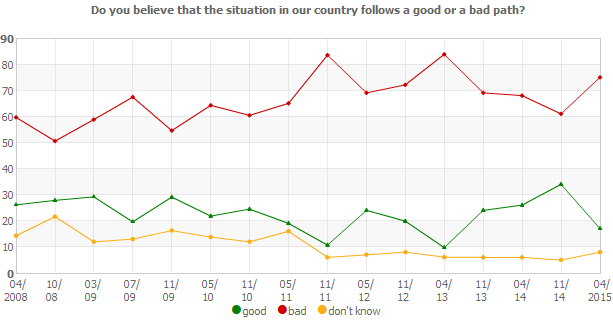
The stolen billion, which, according to authorities, shall be transformed into public debt, had an immediate impact on the perception of the state of economy in Moldova. The scandal shook the financial market, and ~80% of citizens declared displeasure with the economic situation. It is one of the biggest “performances” of the “pro-European” government, as the share of the displeased has gained 25% since 2008.
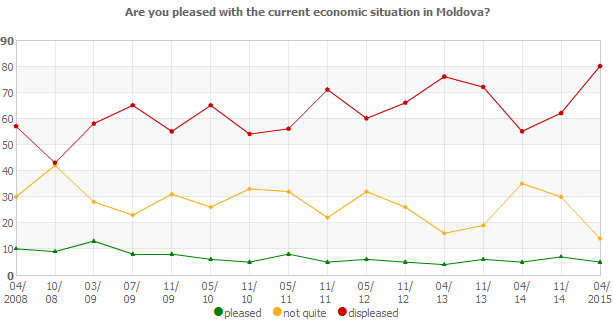
It is important to observe the correlations between perceptions about the general state of economy and the developments over the past year, when the theft of the century came into the light, which was one more indication to the dramatic worsening of the situation. Here, again, one should compare the situation from the period of the communist government that currently assists the minority pro-European government, which came to power after the revolution of 7 April 2009.
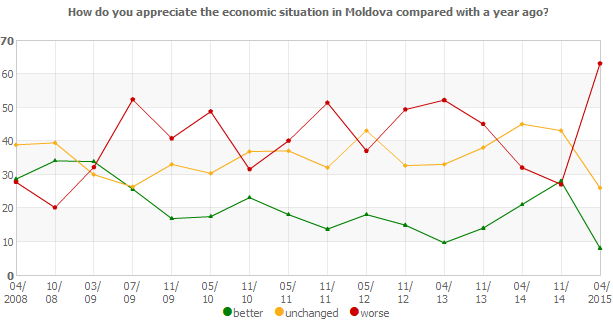
It is even more important to see the citizens’ expectations for the nearest future. About half of the respondents are expecting even further worsening of the situation in the country in a year, while only ~15% are expecting an improvement. Such expectations might have a major impact on the results of local elections on 14 June 2015, clearly only if they are fair and not eventually funded from the stolen billion.
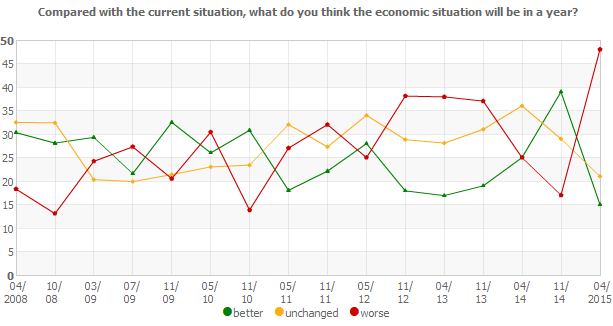
Finally, social optimism develops depending on the worries that persist over years.
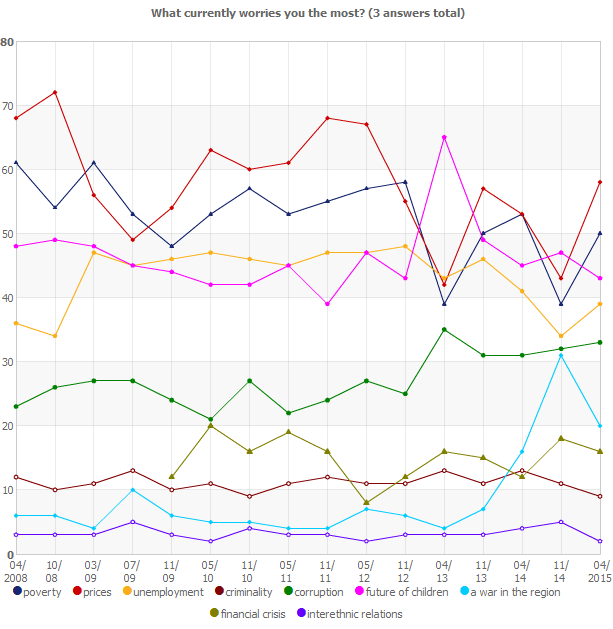
Therefore, prices, unemployment, and poverty jeopardize the future of the children of most Moldovans, and the common denominator of these major worries is corruption. Some of the proofs of that are the constant declarations of a member of the Government, who calls Moldova a “country-prisoner of oligarchic clans”RO. The corrupt government might have a chance to save its rating by doing what it did around the parliamentary elections of November 2014: escalating hysteria about a war in the region. A serious lapse of the governing parties is that they have eased the citizens’ worry about a war in the region and haven’t tried to convince citizens that only European integration promoted by them can save Moldova and that for that purpose Moldovans being charged with one stolen billion is not a too high price.
Trust in institutions
If democracy is institutionalized freedom, then citizens’ trust in public institutions is a relevant indicator to estimate the state of democracy in a society. First, it is the manner in which “pro-European” governments desecrated the state’s institutions that stands out. The three main institutions of the state — Parliament, Government, and Presidency — were “deigned” the trust of only ~10% of citizens. In its last year in government, the Party of Communists enjoyed a level of trust that varied around 30%. After that, expectations of a “success story” followed the instauration in autumn 2009 of a pro-European government, when trust for the main institutions of the state exceeded 40%. Later, the peaks of decreasing trust for the state’s institutions coincided with the three scandals mentioned above.
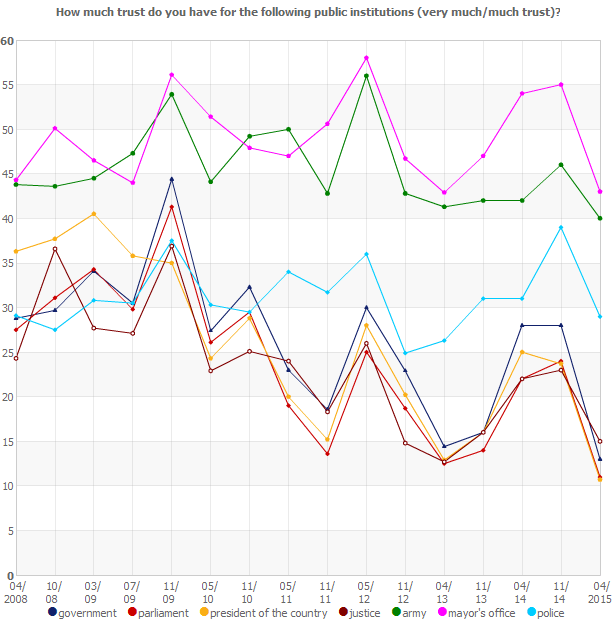
We should mention the constant and relatively high trust of citizens for the army and the local administration; hence the major importance of the local elections of 14 June 2015. For the governing parties (the Liberal Democratic Party of Moldova (PLDM) and the Democratic Party of Moldova (PDM)) and for their acolyte (the Party of Communists) it is very important not to fail completely in these elections, so as to maintain at least a shadow of legitimacy. In this sense, it is opportune to look at the citizens’ trust for private and non-governmental institutions.
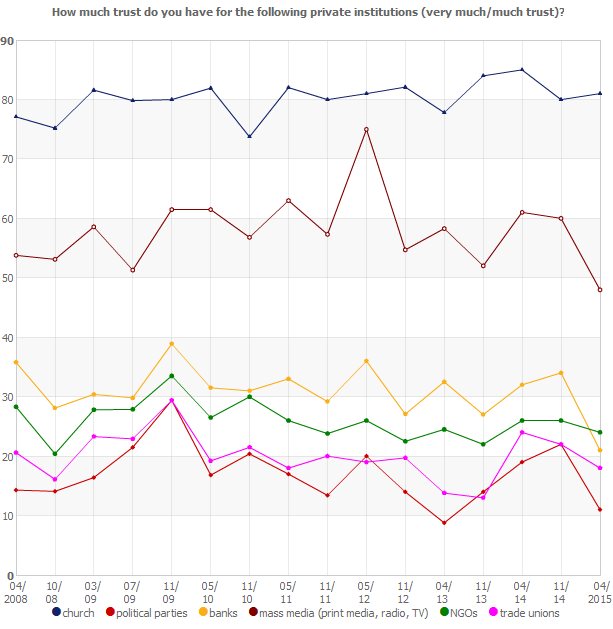
Parties, as you can see in the above image, have constantly had the weakest rating of citizens’ trust, ~10%. As it has already been said, they managed the “performance” of crashing the ratings of the main public institutions. It is very important to mention that the church and media outlets are among the organizations with the highest level of trust, 90% and 50%, accordingly. In fact, the church and mass media with their high ratings become sources used by and for corrupt parties with very small ratings. As mass media and the advertising market are monopolized, in the proportion of 70–80%, by oligarchs, who control the governing parties as well, it is easy to understand that the distortion of realities and intoxication of public opinion are the favorite occupations of these institutions. Hysteria about the danger of a war in the region, mentioned above, is a proof. On the other hand, the stolen billion, which makes up ~1/3 of the National Bank reserves, was not presented as a threat at the national security of Moldova.
Referring to the church, it should be mentioned that the benedictionRO of members of Parliament during the Holy Week, on 9 April 2015, by the Metropolitan of Chisinau and All Moldova Vladimir was rather ambiguous. First, such events are not part of the local tradition. Second, the event took place in the middle of the stolen billion scandal, which couldn’t have happened without the political coverage of the main parliamentary parties. It is important that MPs recognize the fact of an unprecedented theft, and the greed or love for money is one of the 7 deadly sins. In this sense, the benediction of MPs, some of whom were definitely the architects of the theft of the century, raised confusion. Third, the church’s acceptance of financial resources from businessmen politicians for bringing the Holy Fire from Jerusalem reminds of the reprehensible old story of selling indulgencies, which led to the Reformation in the Western world. In the sense of the above mentioned, inappropriate jokes were made, such as the Holy Fire was green, the color of one of the governing parties whose leader financed the trip to Jerusalem. These things happen although the absolute majority of citizens believe that it is normal for the faith and ancestral traditions be kept and sacredly protected. Otherwise, citizens might think that deadly sins can be redeemed here, on Earth, by applying some political technologies.
It is very important to grasp from the BPO the preferred solution of citizens for relieving the country from overwhelming problems and improving the socio-economic situation. We can see that the solution agreed by the majority of citizens is change of the country’s leadership. It is curious that while during the rule of the Party of Communists this option was shared by ~20% and was realized by the revolution of 7 April 2009, it is currently shared by ~45% and is accompanied by a massive protest movement. It should be mentioned that in 2013, in the middle of the corruption crisis, this option had an even stronger support, and it made the leaders of the governing parties hide in the shadow, bringing out new faces. Now, those leaders remain in the shadow, pulling strings from there, so the desire to change the power no longer refers only to leaders, but also to the parties in power.
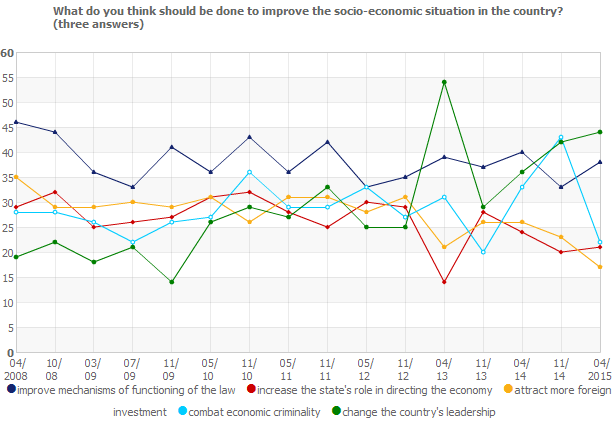
Evolution of trust for politicians and parties
Transition from general questions to questions referring to concrete politicians and parties headed by them reveals a very close correlation in the respondents’ answers. Thus, the BPO shows a dramatic fall in the trust for Liberal Democratic Party (PLDM) leader Vlad Filat, Democratic Party (PDM) leader Marian Lupu, and Party of Communists (PCRM) leader Vladimir Voronin. Regarding the de facto leader of PDM, Vlad Plahotniuc, one can say that he has been the absolute champion in trust (more than 90% of respondents have no trust for him). It is easy to understand that the situation couldn’t be any different, since 70% of respondents believe that the theft of the century had been prepared with participation of the governing parties. The situation with PCRM leader Vladimir Voronin is also clear. He was saying one thing before the parliamentary elections of November 2014, but did other things after the elections, supporting the minority coalition of the PLDM and the PDM. So the PCRM commitment to its principles has been justly appreciated.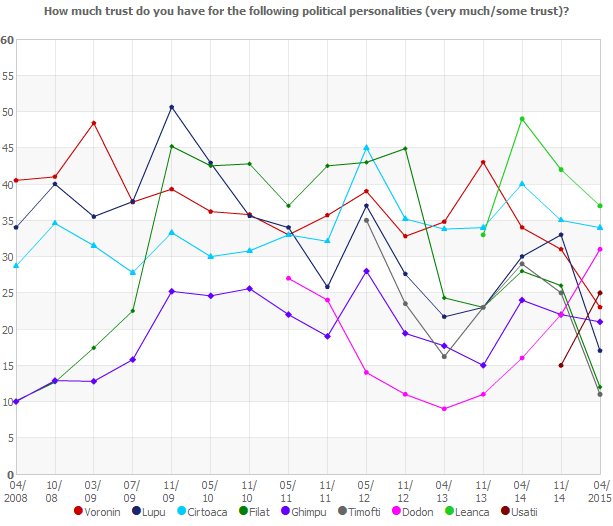
The only politicians with growing trust are the leaders of Russophile parties: Party of Socialists of the Republic of Moldova (PSRM) leader Igor Dodon and “Partidul Nostru (Our Party)” (PN) leader Renato Usatii. The PSRM leader is also in top according to answers to the open question about trust for politicians. Despite being a little outrun by former Prime Minister Iurie Leanca, Dodon is in the clearly ascending trend, while Leanca — in inertial relaxation.
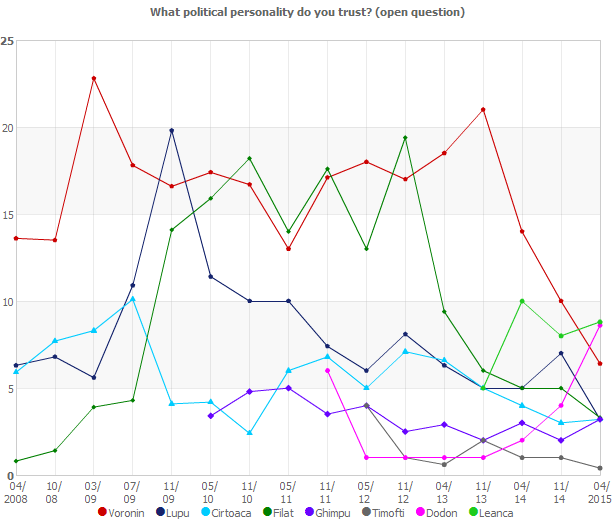
Trust for parties replicates the trends in trust for political leaders.
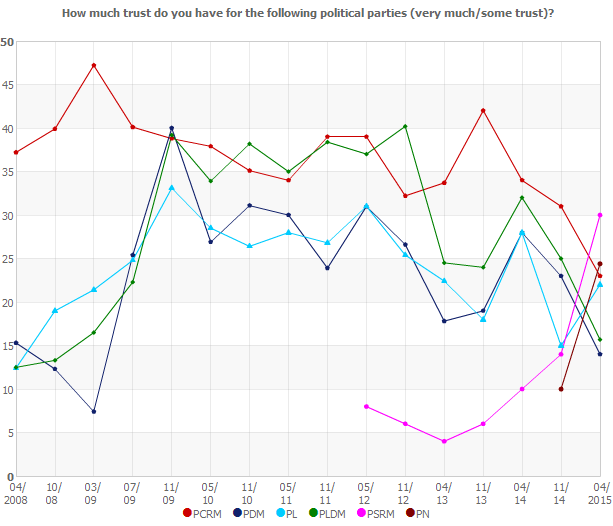
Also, answers to the question about voting intentions at eventual general elections very well correlate with the answers to questions about trust for leaders and their parties. It should be mentioned that voting intentions for PLDM and PDM dropped to the level of 2009, and for PL they approach the level of the “twitter revolution”. PCRM is in attenuated fall, following an abrupt drop in 2014. Beneficiary of this situation is the PSRM: after confiscation of Russian speaking voters at the parliamentary elections of November 2014, it is about to confiscate a large part of the Moldovan electorate with left-wing views. Thus, PCRM is paying the price for hesitant policy of the past year and for supporting the minority government of the PLDM-PDM coalition.
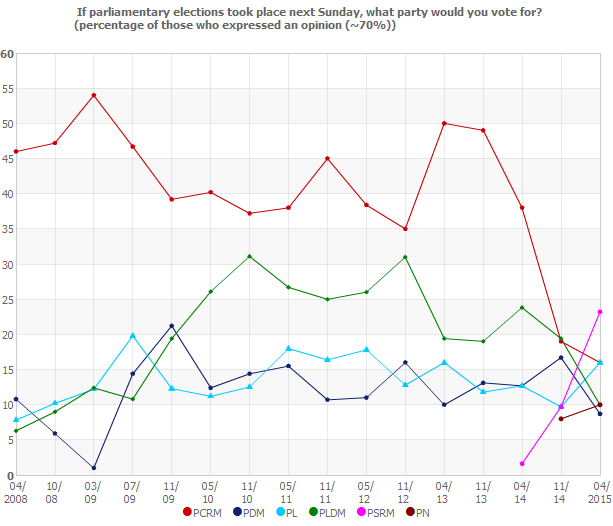
Consequences of “pro-European” government
After coming to power in 2009, the political parties that called themselves pro-European worked for a single year in the spirit of the initially announced objectives. This term was very short and was enough for Moldova to be credited, in fact, with a “white check” by the European Union and other development partners that supported Moldova in different areas, especially political and financial. The results of this support were the visa-free regime offered to Moldova and the signing of the Association Agreement that provides for creation of the Deep and Comprehensive Free Trade Area, which is a must for parties and requires, especially from Moldova, competence, dedication, and citizens’ credibility.
After a series of unprecedented scandals that have been taking place since 2011, the image of pro-European members of government worsened dramatically, both in the eyes of European partners and in the eyes of their own citizens. As a result, citizens changed their attitude towards the country’s European vector, which is in the most absurd manner promoted by a deeply corrupt government. This conclusion is suggested by the data of the BPO, according to which over 80% of respondents think that corruption increased while the current government was in power, and only ~7% believe that the level of corruption dropped.
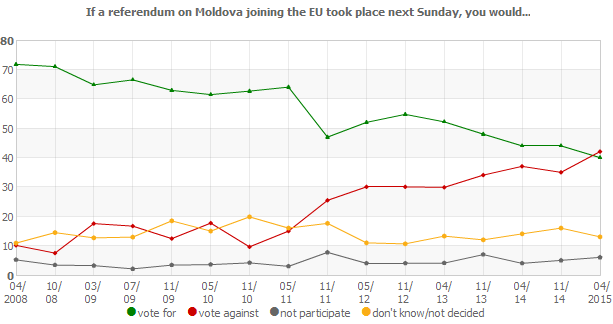
Therefore, the scandals provoked by the corrupt government, self-proclaimed “pro-European”, led to the loss of citizens’ support for European integration. Moreover, a constant impression appeared that citizens with pro-European views are somehow blackmailed that if they change their electoral options for other political organizations, they would undermine the European integration vector in favor of pro-Eurasian parties. This idea has been insistently accredited by the media and political commentators affiliated to governing parties. It would be more honest for them to say that “pro-European” parties simply charged citizens with one stolen billion. But serious issues don’t end with the charge of the stolen billion, but the very subject of the charge — the European vector — is in danger of being lost. The BPO unequivocally shows that after the scandal of the stolen billion the integration balance significantly bent towards the Eurasian vector.
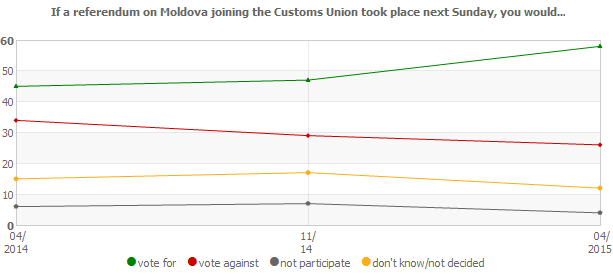
It is not the protests against the stolen billion that incline the balance in favor of pro-Eurasian parties, but the theft itself. On the contrary, anti-corruption protests can eventually save the European vector by removing corrupt party leaders. In fact, if self-proclaimed “pro-European” leaders and parties were the way they pretend to be, they would act European-like and would resign or dismiss the leadership involved in corruption scandals. Thus they would save the country’s image, relieving it from a heavy burden of leaving it simply without a future because of the migration of talented youth from this country, where they have no perspectives. However, it is unlikely for the dramatic situation in Moldova to have a happy ending, which it would have had if the so-called pro-European parties were truly European.
Conclusions
The BPO clearly shows that the situation in Moldova is at the limit of the socio-economic balance. If the nearing local elections of June are free and fair, the current pro-governmental parties should receive a negative vote from people for the wrongdoings they allowed, especially for the stolen billion. The results of the BPO suggest no possibility of an eventual rehabilitation of governing parties and their acolytes. On the other hand, these parties have the entire arsenal of manipulation instruments: unlimited financial resources, perhaps including the stolen billion; impressive media resources, concentrated in the hands of oligarchs, party leaders; the levers of the entire administrative apparatus; and, the most important, motivation not to lose the elections. The loss of the local elections by governing parties would mean only a de facto confirmation of the de-legitimization, meaning the need to convoke early parliamentary elections, with all predictable and unpredictable consequences for the current government. So, we might expect all kinds of maneuvers and reshuffles after the local elections of 14 June. A fundamental problem will still remain, though: How does the current government intend to implement the Association Agreement with their legitimacy lost as a result of the stolen billion and without popular support?


